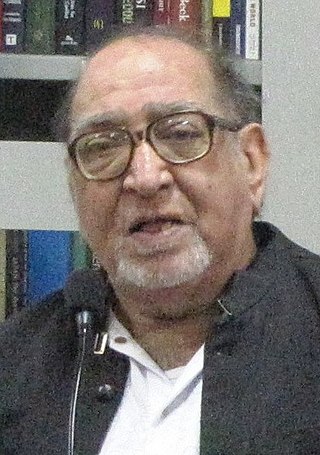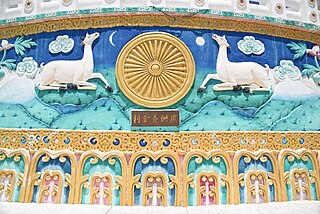
Jawaharlal Nehru was an Indian anti-colonial nationalist, statesman, secular humanist, social democrat, and author who was a central figure in India during the middle of the 20th century. Nehru was a principal leader of the Indian nationalist movement in the 1930s and 1940s. Upon India's independence in 1947, he served as the country's first prime minister for 16 years. Nehru promoted parliamentary democracy, secularism, and science and technology during the 1950s, powerfully influencing India's arc as a modern nation. In international affairs, he steered India clear of the two blocs of the Cold War. A well-regarded author, his books written in prison, such as Letters from a Father to His Daughter (1929), An Autobiography (1936) and The Discovery of India (1946), have been read around the world.

The Deobandi movement or Deobandism is a revivalist movement within Sunni Islam that adheres to the Hanafi school of law. It formed in the late 19th century around the Darul Uloom Madrassa in Deoband, India, from which the name derives, by Muhammad Qasim Nanautavi, Rashid Ahmad Gangohi, and several others, after the Indian Rebellion of 1857–58. They opposed influence of non-Muslim cultures on the Muslim of South Asia. The movement pioneered education in religious sciences through the Dars-i-Nizami associated with the Lucknow-based ulama of Firangi Mahal with the goal of preserving traditional Islamic teachings from the influx of modernist, secular ideas during British colonial rule. The Deobandi movement's Indian clerical wing, Jamiat Ulema-e-Hind, was founded in 1919 and played a major role in the Indian independence movement through its participation in the Pan-Islamist Khilafat movement and propagation of the doctrine of composite nationalism.

Tablighi Jamaat is an international Islamic religious movement focuses on exhorting Muslims to be more religiously observant and encouraging fellow members to return to practising their religion as per the Islamic prophet Muhammad, and secondarily give dawah (calling) to non-Muslims. "One of the most widespread Sunni" islah (reform) and called "one of the most influential religious movements in 20th-century Islam," the organization is estimated to have between 150 and 200 million adherents worldwide, spread over 150 countries, with the majority living in South Asia.

Asghar Ali Engineer was an Indian reformist writer and social activist. Internationally known for his work on liberation theology in Islam, he led the Progressive Dawoodi Bohra movement. The focus of his work was on communalism and communal and ethnic violence in India and South Asia. He was a votary of peace and non-violence and lectured all over world on communal harmony.

Muḥammad Ilyās ibn Muḥammad Ismā‘īl Kāndhlawī Dihlawī was an Indian Islamic scholar who founded the Tablighi Jamaat Islamic revivalist movement, in 1925, in Mewat province.
Usha Sanyal is an Indian scholar and historian of Islam specializing in the Barelvi movement. She was a visiting assistant professor of history at Wingate University in North Carolina.
The Six Kalmas , also known as the Six Traditions or the Six Phrases, are six Islamic phrases (prayers) often recited by Muslims. The phrases are taken in part from hadiths.

Ladakh Buddhist Association (LBA) is an organization in Ladakh, India concerned with interests of Buddhists in Ladakh. It was founded in 1933 by King Jigmet Dadul Namgyal, Kalon Tsewang Rigzin, lachumir Munshi Sonam Tsewang and Kalon Bankapa Morup Gyaltsan
Mushirul Hasan was a historian of modern India. He wrote on the partition of India, communalism, and on the history of Islam in South Asia.
Farish A. Noor also known as Badrol Hisham Ahmad Noor is a Malaysian academician, historian, and political scientist that is currently serving as a professor at the Department of History, Faculty of Arts and Social Sciences, University of Malaya.
Shah Abdur Rahim was an Islamic scholar and a writer who assisted in the compilation of Fatawa-e-Alamgiri, the voluminous code of Islamic law. He was the father of the Muslim philosopher Shah Waliullah Dehlawi. He became a disciple of Khwaja Khurd son of Khawaja Baqi Billah a revered Sufi of Delhi. He established Madrasa Rahimiyya in Delhi, a theological college which later played a part in the religious emancipation of Muslim India and became the breeding ground of religious reformers and mujahideen like Shah Waliullah and Shah Abdul Aziz.
Sheeba Aslam Fehmi is a feminist writer, research scholar and a senior journalist based in India.
Susan Visvanathan is an Indian sociologist, social anthropologist and a fiction writer. She is well known for her writings on religious dialogue and sociology of religion. Her first book Christians of Kerala: History, Belief and Ritual among the Yakoba is a pathbreaking work in the field of sociology of religion.
Dipankar Gupta is an Indian sociologist and public intellectual. He was formerly Professor in the Centre for the Study of Social Systems, Jawaharlal Nehru University, New Delhi. For a brief period from 1993 to 1994, he was also associated with the Delhi School of Economics as Professor in the Department of Sociology. His current research interests include rural-urban transformation, labour laws in the informal sector, modernity, ethnicity, caste and stratification. He is a regular columnist with The Times of India, The Hindu and occasionally in The Indian Express and Anandbazar Patrika in Bengali. He serves on the board of institutions like the Reserve Bank of India, the National Bank for Agricultural and Rural Development (NABARD) and Max India.

Jamia Salafia, Varanasi is an Islamic jamia or seminary university located in the city of Varanasi in India. It was set up in 1966 by the Jamiat-Ahle Hadith-e-Hind. The then ambassador of Saudi Arabia to India Yusuf Al-Fauzan inaugurated the Jamia. It is the largest Salafi-Ahle Hadith institution in India. The university is funded by government of Saudi Arabia and most of the teachers are graduated from Saudi Arabian Islamic universities. Saudi government prescribe Indian Muslims to take education from the university. The institution follows Salafi doctrine.

Shams Naved Usmani was an Indian Muslim scholar. He belonged to the Usmani family of Deoband and was an alumnus of the University of Lucknow. He held the titles of Acharya and Maulana together. He was known for his inter-faith dialogues.
Chitralekha Zutshi is a historian of Kashmir and an Associate Professor of History at the College of William and Mary, USA.
Religious education in Kerala was historically influenced by traditional Indian religions like Hinduism, Buddhism and Jainism through the ancient education system of Gurukula. Abrahamic religions were practiced in Kerala through the early days of maritime trade. Buddhism added educational vocabulary, including Namostu Jinatam, Ezhuthu Palli, and Pallikoodam to the Malayalam language. Madrasa institutions, coordinated by various Madarasa education boards referred to as Othupalli or Palli Dar since the independence of India. Modern Christian education began in the early 19th century.

This bibliography of Deobandi Movement is a selected list of generally available scholarly resources related to Deobandi Movement, a revivalist movement within Sunni Islam, adhering to the Hanafi school of law, formed in the late 19th century around the Darul Uloom Deoband in British India, from which the name derives, by Qasim Nanawtawi, Rashid Ahmad Gangohi and several others, after the Indian Rebellion of 1857–58. It is one of the most influential reform movements in modern Islam. Islamic Revival in British India by Barbara D. Metcalf was the first major monograph specifically devoted to the institutional and intellectual history of this movement. Muhammad Tayyib Qasmi wrote a book named The Tradition of the Scholars of Deoband: Maslak Ulama-i-Deoband, a primary source on the contours of Deobandi ideology. In this work, he tried to project Deoband as an ideology of moderation that is a composite of various knowledge traditions in Islam. This list will include Books and theses written on Deobandi Movement and articles published about this movement in various journals, newspapers, encyclopedias, seminars, websites etc. in APA style. Only bibliography related to Deobandi Movement will be included here, for Darul Uloom Deoband, see Bibliography of Darul Uloom Deoband.

This bibliography of Darul Uloom Deoband is a selected list of generally available scholarly resources related to Darul Uloom Deoband, a leading Islamic seminary and Muslim theological centre in India at which the Deobandi movement began, founded in 1866. It is one of the most influential reform movements in modern Islam. It created a largest network of satellite madrasas all over the world especially India, Bangladesh, Pakistan, Afghanistan neighboring countries in Asia and beyond, and as far afield as the Caribbean, South Africa, United Kingdom and the United States. Islamic Revival in British India by Barbara D. Metcalf was the first major monograph specifically devoted to the institutional and intellectual history of Deoband. Syed Mehboob Rizwi wrote History of Darul Uloom Deoband in 1977 in 2 volumes. This list will include Books and theses written on Darul Uloom Deoband and articles published about Deoband in various journals, newspapers, encyclopedias, seminars, websites etc. in APA style. Only bibliography related to Darul Uloom Deoband will be included here, for Deobandi movement, see Bibliography of Deobandi Movement.







